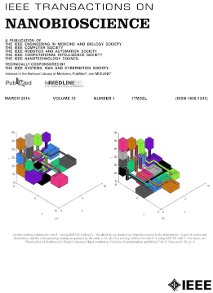A Lab in Your Pocket

The cover of IEEE Transactions on Nanobiosciences featured Shiyan Hu's research on using CAD to create labs-on-a-chip that could run dozens of medical tests in minutes.
These labs-on-a-chip would not only be quick—results are available in minutes—but also inexpensive and portable. They could be used miles from the nearest medical clinic to test for anything from HIV to diabetes. But as powerful as they may be, they could be far better, says Shiyan Hu, an associate professor of electrical and computer engineering at Michigan Technological University.
Generally, a lab-on-a-chip (LOC) can run no more than a test or two. That’s because the chips are designed manually, says Hu. If the LOC were made using computer-aided design, you could run dozens of tests with a single drop of blood.
“In a very short time, you could test for many conditions,” he said. “This really would be an entire lab on a chip.”
With PhD student Chen Liao, Hu has taken the first step. “We have developed software to design the hardware,” he said. Their work focuses on routing the droplet of blood or other fluid through each test on the chip efficiently while avoiding any chip contamination.
“It has taken us four years to do the software, but to manufacture the LOC would be inexpensive,” Hu said. “The materials are very cheap, and the results are more accurate than a conventional lab’s.”
Ultimately, Hu aims to fabricate their own biochip using their software.
Their work was featured on the cover of the March edition of IEEE Transactions on Nanobiosciences and described in the article “Physical-Level Synthesis for Digital Lab-On-a-Chip Considering Variation, Contamination, and Defect.” Liao was partially supported by an A. Richard Newton Graduate Scholarship, awarded by the Design Automation Conference.
Michigan Technological University (www.mtu.edu) is a leading public research university developing new technologies and preparing students to create the future for a prosperous and sustainable world. Michigan Tech offers more than 130 undergraduate and graduate degree programs in engineering; forest resources; computing; technology; business; economics; natural, physical and environmental sciences; arts; humanities; and social sciences.
Media Contact
More Information:
http://www.mtu.edu/news/stories/2014/may/lab-your-pocket.htmlAll latest news from the category: Life Sciences and Chemistry
Articles and reports from the Life Sciences and chemistry area deal with applied and basic research into modern biology, chemistry and human medicine.
Valuable information can be found on a range of life sciences fields including bacteriology, biochemistry, bionics, bioinformatics, biophysics, biotechnology, genetics, geobotany, human biology, marine biology, microbiology, molecular biology, cellular biology, zoology, bioinorganic chemistry, microchemistry and environmental chemistry.
Newest articles

A universal framework for spatial biology
SpatialData is a freely accessible tool to unify and integrate data from different omics technologies accounting for spatial information, which can provide holistic insights into health and disease. Biological processes…

How complex biological processes arise
A $20 million grant from the U.S. National Science Foundation (NSF) will support the establishment and operation of the National Synthesis Center for Emergence in the Molecular and Cellular Sciences (NCEMS) at…

Airborne single-photon lidar system achieves high-resolution 3D imaging
Compact, low-power system opens doors for photon-efficient drone and satellite-based environmental monitoring and mapping. Researchers have developed a compact and lightweight single-photon airborne lidar system that can acquire high-resolution 3D…





















